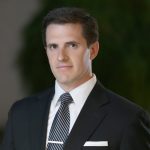In Person Only at the Boston Park Plaza
10 A and 10B – Exact Constraint Design of Precision Flexures – Parts 1 & 2
Dr. Jonathan B. Hopkins (University of California – Los Angeles)
Monday, November 13, 2023
2:00 PM – 6:00 PM (EST USA) – Part 1
Tuesday, November 14, 2023
2:00 PM – 6:00 PM (EST USA) – Part 1
Advanced flexure synthesis principles, modeling approaches, engineering tools, and best practices. Applications: precision motion stages, general purpose flexure bearings, and MEMS/Nano-scale positioning systems. Emphasis on kinematic flexure synthesis using principles of constraint-based design, screw theory, and projective geometry. Lectures, examples, and hands-on exercises involving “build-your-own” flexure kits. Attendees are encouraged to bring flexure examples for analysis and discussion.
Part 1 Overview
- Flexible Constraint Theory: Constraint and DOF relationship; exact, over, and underconstraint; modeling flexures using constraint lines; kinematic equivalence
- Constraints and the Motions they Permit: Modeling translations as rotations; principles of projective geometry in flexure synthesis; rule of complementary patterns; introduction to freedom and constraint spaces as deterministic synthesis tools
- Freedom and Constraint Topologies (FACT): Designing parallel flexure systems using freedom and constraint spaces.
Part 2 Overview
- Synthesizing Serial Flexure Systems using FACT: Intermediate freedom spaces; stacking parallel modules; synthesizing parallel and serial elements.
- Actuating Flexure Systems: Calculating static and dynamic actuation spaces as a way to select the optimal kind, number, location, and orientation of actuators for actuating systems with minimal parasitic error.
- Case Study Analysis and Discussion: Practice applying FACT to the design of precision flexure systems. Analyze and discuss flexures brought to the course.
No previous experience is required for either part but Part 1 should be taken as a prerequisite to Part 2.

Dr. Jonathan Hopkins is a full Professor of Mechanical Engineering at the University of California, Los Angeles (UCLA). He is the director of the Flexible Research Group and conducts research toward enabling the design and fabrication of advanced flexible structures, mechanisms, and materials. In May of 2016, Jonathan received the Presidential Early Career Award for Scientists and Engineers (PECASE) at the White House for his work in this area. PECASE is the highest honor bestowed by the United States Government on science and engineering professionals in the early stages of their independent research careers. Jonathan also received ASME’s Freudenstein/General Motors Young Investigator Award, UCLA’s Watanabe Excellence in Research Award, the Northrop Grumman Excellence in Teaching Award, and was most recently elected an ASME Fellow. Jonathan is the creator and host of the educational YouTube channel, “The FACTs of Mechanical Design.” Prior to his joining the faculty at UCLA in 2013, Jonathan was a postdoctoral researcher at Lawrence Livermore National Laboratory from 2010 to 2013 where he conducted research toward enabling the design and fabrication of compliant microarchitected materials that exhibit naturally unobtainable combinations of mechanical properties via the deformation of their constituent flexible elements. He received his Ph.D. (2010), Master’s (2007), and Bachelor’s (2005) degrees all in Mechanical Engineering at the Massachusetts Institute of Technology where he created a new design approach for synthesizing compliant systems called Freedom, Actuation, and Constraint Topologies (FACT).

